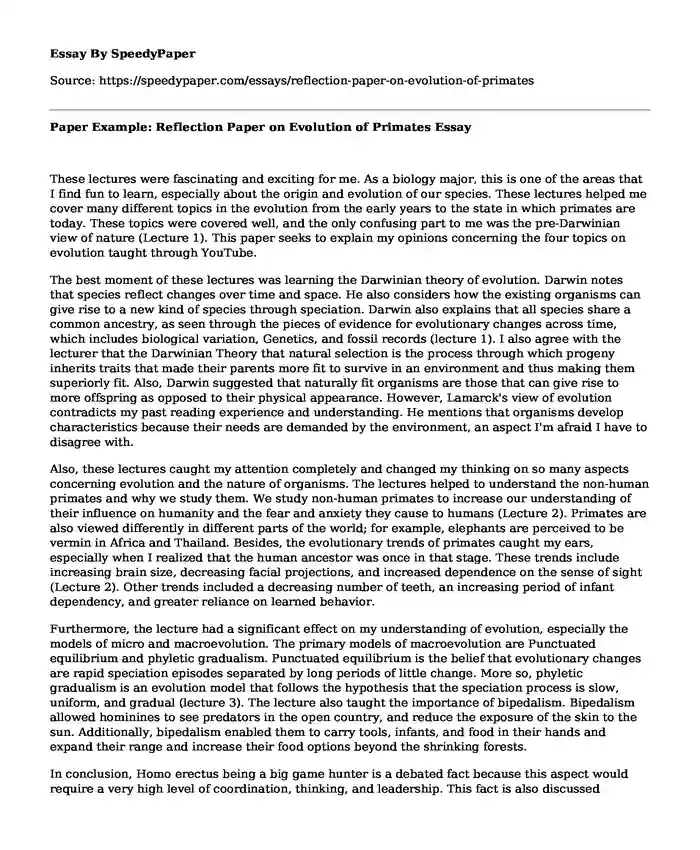
| Essay type: | Reflective essays |
| Categories: | Knowledge Biology YouTube |
| Pages: | 3 |
| Wordcount: | 649 words |
These lectures were fascinating and exciting for me. As a biology major, this is one of the areas that I find fun to learn, especially about the origin and evolution of our species. These lectures helped me cover many different topics in the evolution from the early years to the state in which primates are today. These topics were covered well, and the only confusing part to me was the pre-Darwinian view of nature (Lecture 1). This paper seeks to explain my opinions concerning the four topics on evolution taught through YouTube.
The best moment of these lectures was learning the Darwinian theory of evolution. Darwin notes that species reflect changes over time and space. He also considers how the existing organisms can give rise to a new kind of species through speciation. Darwin also explains that all species share a common ancestry, as seen through the pieces of evidence for evolutionary changes across time, which includes biological variation, Genetics, and fossil records (lecture 1). I also agree with the lecturer that the Darwinian Theory that natural selection is the process through which progeny inherits traits that made their parents more fit to survive in an environment and thus making them superiorly fit. Also, Darwin suggested that naturally fit organisms are those that can give rise to more offspring as opposed to their physical appearance. However, Lamarck's view of evolution contradicts my past reading experience and understanding. He mentions that organisms develop characteristics because their needs are demanded by the environment, an aspect I'm afraid I have to disagree with.
Also, these lectures caught my attention completely and changed my thinking on so many aspects concerning evolution and the nature of organisms. The lectures helped to understand the non-human primates and why we study them. We study non-human primates to increase our understanding of their influence on humanity and the fear and anxiety they cause to humans (Lecture 2). Primates are also viewed differently in different parts of the world; for example, elephants are perceived to be vermin in Africa and Thailand. Besides, the evolutionary trends of primates caught my ears, especially when I realized that the human ancestor was once in that stage. These trends include increasing brain size, decreasing facial projections, and increased dependence on the sense of sight (Lecture 2). Other trends included a decreasing number of teeth, an increasing period of infant dependency, and greater reliance on learned behavior.
Furthermore, the lecture had a significant effect on my understanding of evolution, especially the models of micro and macroevolution. The primary models of macroevolution are Punctuated equilibrium and phyletic gradualism. Punctuated equilibrium is the belief that evolutionary changes are rapid speciation episodes separated by long periods of little change. More so, phyletic gradualism is an evolution model that follows the hypothesis that the speciation process is slow, uniform, and gradual (lecture 3). The lecture also taught the importance of bipedalism. Bipedalism allowed hominines to see predators in the open country, and reduce the exposure of the skin to the sun. Additionally, bipedalism enabled them to carry tools, infants, and food in their hands and expand their range and increase their food options beyond the shrinking forests.
In conclusion, Homo erectus being a big game hunter is a debated fact because this aspect would require a very high level of coordination, thinking, and leadership. This fact is also discussed because Homo erectus is linked to the tradition of stone making and other Acheulian tools like hand axes (Lecture 3). They were also seen to make and control the use of fire, as seen in the sites they were discovered. This debate is significant because it shows that the Homo erectus had a culture to know whether the Homo erectus was able to hunt the big game animals.
Works cited
Raymond, F. Bio, Anthro Human Evolution: Lectures 1, 2, and 3. June 28, 2020. https://youtu.be/mEiGDJ2cFYY, https://youtu.be/5OHnYnQmQxY, and https://youtu.be/y1VAXB187x0
Cite this page
Paper Example: Reflection Paper on Evolution of Primates. (2023, Sep 19). Retrieved from https://speedypaper.net/essays/reflection-paper-on-evolution-of-primates
Request Removal
If you are the original author of this essay and no longer wish to have it published on the SpeedyPaper website, please click below to request its removal:
- Admission Essay Sample for a CRNA Program in TCU
- Study Abroad - Free Paper with a Personal Statement Sample
- Philosophical Essay Example
- My Reading Nightmare Essay Sample
- Essay Sample on Slavery and the American Political History
- Personal Essay Example for Apply Graduate School
- Role of Teachers in Ell Assessments - Free Essay Example
Popular categories




